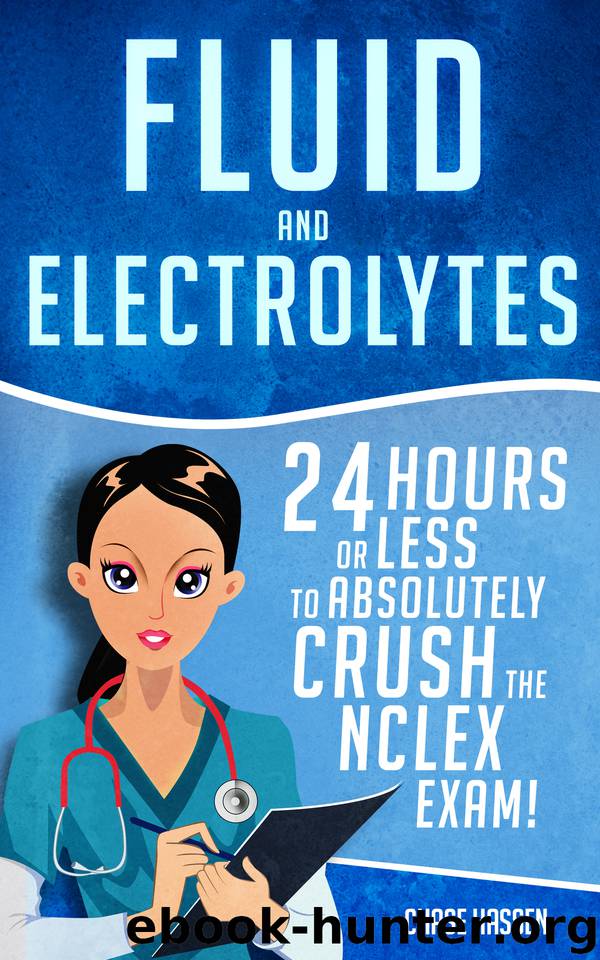Fluid and Electrolytes: 24 Hours or Less to Absolutely Crush the NCLEX Exam! (Nursing Review Questions and RN Content Guide, Registered Nurse, Practitioner, ... Exam Prep, Medical by Chase Hassen

Author:Chase Hassen [Hassen, Chase]
Language: eng
Format: azw3
Publisher: Nurse Superhero
Published: 2015-06-11T16:00:00+00:00
Testing for Chloride in the blood and Urine
Because chloride is such an essential part of health and living, it is often measured as part of an electrolyte profile, a common blood test performed on the body. A urine test can measure the amount of chloride leaving the body through kidney filtration. In order to do this test, all of the urine excreted during a twenty-four hour period of time is collected and the sodium chloride content of the urine is assessed. The levels of potassium, bicarbonate, sodium, and chloride are usually measured from the bloodstream at the same time in order to get an idea of the electrolyte milieu of the body’s bloodstream. Chloride can be measured in a special test called the skin sweat test, in which a patch is placed on the arm for a period of time and the electrolytes in the sweat on the patch are measured. This is a test for cystic fibrosis.
Normal Values of Chloride in the Body
The normal reference range for chloride varies with age. For example, a normal chloride content in adult blood is 96-106 mEq/L, while newborn infants can have a chloride content in their blood plasma of between 96 and 113 mEq/L. Adults secrete about 140-250 mEq per 24 hour sample in the urine per 24 hours if they have healthy kidney function. Children and toddlers excrete lesser amounts of chloride in the urine, in the range of 15-176 mEq/24 hour sample.
Remember that chloride concentrations go along directly with the levels of sodium and potassium levels as they are found in dissolved form of NaCl and KCl in the body. For this reason, tests of chloride are rarely done alone but are performed in conjunction with the potassium, sodium, and bicarbonate levels of the blood in a chemistry profile. More information can be retrieved from an entire electrolyte panel than can be done by doing electrolyte levels separate from one another.
Download
This site does not store any files on its server. We only index and link to content provided by other sites. Please contact the content providers to delete copyright contents if any and email us, we'll remove relevant links or contents immediately.
Spare by Prince Harry The Duke of Sussex(5173)
Navigation and Map Reading by K Andrew(5147)
Tuesdays with Morrie by Mitch Albom(4763)
Machine Learning at Scale with H2O by Gregory Keys | David Whiting(4289)
Cracking the GRE Premium Edition with 6 Practice Tests, 2015 (Graduate School Test Preparation) by Princeton Review(4270)
Never by Ken Follett(3930)
Goodbye Paradise(3795)
What It Really Takes to Get Into Ivy League and Other Highly Selective Colleges by Hughes Chuck(3741)
Fairy Tale by Stephen King(3365)
Harry Potter and the Prisoner of Azkaban (Book 3) by J. K. Rowling(3346)
Pledged by Alexandra Robbins(3169)
Kick Ass in College: Highest Rated "How to Study in College" Book | 77 Ninja Study Skills Tips and Career Strategies | Motivational for College Students: A Guerrilla Guide to College Success by Fox Gunnar(3113)
Reminders of Him: A Novel by Colleen Hoover(3070)
A Dictionary of Sociology by Unknown(3069)
Sapiens and Homo Deus by Yuval Noah Harari(3058)
The Social Psychology of Inequality by Unknown(3013)
Graduate Admissions Essays, Fourth Edition: Write Your Way into the Graduate School of Your Choice (Graduate Admissions Essays: Write Your Way Into the) by Asher Donald(2905)
Will by Will Smith(2901)
Zero to Make by David Lang(2775)
